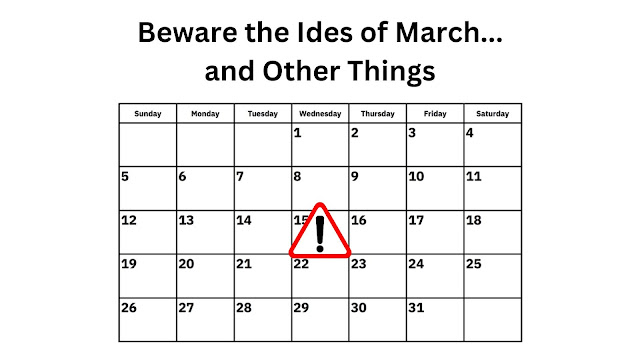Beware the Ides of March...and Other Things
"Beware the ides of March" is one of the most well-known phrases in all of Shakespeare. Let's take a look at some of his other iconic warnings.
1) "Beware the ides of March." (Julius Caesar, I.2.18, I.2.19, and I.2.23)
This phrase, first spoken in warning by the Soothsayer to Julius Caesar, is repeated two more times in less than a minute on stage. The "ides" of any given month referred to the first new moon of that month, which usually fell between the 13th and 15th days of the month in our calendar system. The "ides of March" is the 74th day of the Roman calendar, which corresponds to March 15––the date of Julius Caesar's assassination in 44 BCE.
2) "O beware, my lord, of jealousy!" (Othello, III.3.195)
This warning, spoken by Iago to Othello, is an ironic moment for the audience. Using reverse psychology, Iago manipulates Othello into believing that Desdemona has cheated on him with Cassio and cultivates in Othello the very jealousy he warns against. Iago succeeds in creating a jealousy so strong in Othello that he murders Desdemona. This line is followed by the most iconic phrase in the play, when Iago describes jealousy as "the green-eyed monster" (Othello, III.3.196).
3) "Macbeth! Macbeth! Beware Macduff; / Beware the thane of Fife!" (Macbeth, IV.1.81-82)
The First apparition, an armed head, delivers this warning to Macbeth. Because of this prophecy, Macbeth attempts to murder Macduff, but Macduff slays him in the end.
4) "If I be waspish, best beware my sting." (The Taming of the Shrew, II.1.223)
Katherine utters this warning to Petruchio in their first quick witty exchange. Each uses the other's words against them: Petruchio, to argue that he will get Katherine to love him, and Katherine, to assert that he will not.
5) "Priest, beware your beard." (Henry VI, Part 1, I.3.48)
The Duke of Gloucester delivers this line to the Cardinal of Winchester before a fight breaks out among them. The verb "to beard" means to challenge or to defy. This might also be a reference to the torture of beard plucking, as in King Lear when Regan plucks out Gloucester's beard before Cornwall gouges out his eyes.




Comments
Post a Comment
All comments are moderated by the Green-Eyed Blogger to avoid spam. If you do not see your comment right away, do not worry; it is simply undergoing our routine moderation process.